Are you jamming on music videos?
Member
Posts: 89
Joined: 14 giu 2011
I like to play on music videos to songs i like in a special way. Sometimes i like the whole song - sometimes i like the bassline.
The songs often are on youtube and i play on them every day. Sometimes they are changing but at the moment this are my favorites:
https://youtu.be/eMqsWc8muj8
https://youtu.be/Q3Yc3HhSl1Q
https://youtu.be/_8SPnl3qcso
https://youtu.be/F39UP1mjAnc
https://youtu.be/cMOAXm94VWo
Are you playing or practicing or just messing with the pros on videos too?
The songs often are on youtube and i play on them every day. Sometimes they are changing but at the moment this are my favorites:
https://youtu.be/eMqsWc8muj8
https://youtu.be/Q3Yc3HhSl1Q
https://youtu.be/_8SPnl3qcso
https://youtu.be/F39UP1mjAnc
https://youtu.be/cMOAXm94VWo
Are you playing or practicing or just messing with the pros on videos too?
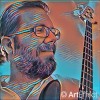
Member
Posts: 213
Joined: 7 mar 2014
i mess around with videos and my guitar. I play along to old 80s metal, usually, LOL. Bass not so much for some reason.
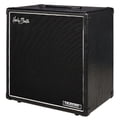
Harley Benton G112 Celestion V30
Cabinet for Electric Guitar

169 €
iThis widget links to Thomann, our affiliate partner. We may receive a commission when you purchase a product there.
Visit Shop

SUPPORTER
Posts: 541
Joined: 25 nov 2013
As a "jammer" It's been part of my practice to make a point to play music and styles I don't know. I use the radio for this and randomly tune into stations, Rock, Pop, Classical, Jazz, whatever. The exercise is the opposite of playing what I know/like. It's about listening intently while playing and being able to lock into the key, chords, rhythm, melody, style, etc. Anticipating where music is going can be easy for some pop/rock styles, gets a bit more difficult with Classical, some jazz, Ethnic, etc. Means that you are NOT relying on memory or fixed patterns and can be well out of your comfort zone. For this exercise you need to be interpreting and playing in real time according to what you hear on the radio and hear in your head that fits and compliments.
If done regularly it has numerous beneficial results: You become a good/better listener; learn many different styles, can anticipate and respond; and most importantly need to be "one with your instrument" in order to play what you can hear.
Getting away form repeated patters/styles and/or playing mechanically forces growth and opens ears and minds. It's never too early to try and make your instrument an extension of yourself so that you can play whatever you hear.
If done regularly it has numerous beneficial results: You become a good/better listener; learn many different styles, can anticipate and respond; and most importantly need to be "one with your instrument" in order to play what you can hear.
Getting away form repeated patters/styles and/or playing mechanically forces growth and opens ears and minds. It's never too early to try and make your instrument an extension of yourself so that you can play whatever you hear.
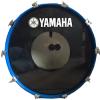
Member
Posts: 522
Joined: 27 feb 2015
Precisely what Wade said. My parents, who were music lecturers and my father a superb pianist, always reinforced the value of being able to improvise and that, basically, you're not a fully-rounded musician until you can. My father would tell about their students who would be incredible virtuosos on their instrument but completely useless if you took the notes away from them...
I spent many, many years when I was starting to drum just sticking on cassettes (I know, showing my age) of my favourite bands (Simple Minds, Van Halen, etc.) and just playing along to them. This had several benefits:
1) It hid the repetition of the drummer's job. Playing the same beat over and over seems less dull when you're playing with 'others'
2) It helped learn good timekeeping
3) You learned about dynamics. Music often needs light and shade
4) It helped you to learn your part in the context of a band and also what worked best for the style
When I used to teach drums, I made a point of telling all my students that 50% of their practice regime should be just sticking on their favourite songs and playing along. If they had any tricky bits, I set aside part of each lesson to help them figure out what was being played. In this day and age, there's no excuse as practically the entire world's music output is available to you at the touch of a button.
Everything I play is jammed to varying degrees. I dep for local bands so the ability to jump in with no rehearsal is vital. I'm not reading music (can't remember how to do that any more) but I often have lyric sheets with cues written on them and maybe a guide beat such as, 'disco beat' or '8th note rock pattern' - the rest is made up on on-the-fly. I rely on my ability to get into a style quickly and jam the rest. Most modern music follows 4, 8, 12 or 16-bar sequences so you can feel the rest!
95% of the loops I record are jammed. I take time to perhaps work out parts for more complex pieces or mark out important changes in my DAW but it's largely made up on-the-spot. That is how I sometimes manage to do so many loops in a day. I also don't have to worry about pitch or being 'in tune'.
The ability to improvise is my lifeline to music. I rely on my experience to understand what's needed for the style and then I'm off. And it starts with playing along to as much music as you can get your hands on!
I spent many, many years when I was starting to drum just sticking on cassettes (I know, showing my age) of my favourite bands (Simple Minds, Van Halen, etc.) and just playing along to them. This had several benefits:
1) It hid the repetition of the drummer's job. Playing the same beat over and over seems less dull when you're playing with 'others'
2) It helped learn good timekeeping
3) You learned about dynamics. Music often needs light and shade
4) It helped you to learn your part in the context of a band and also what worked best for the style
When I used to teach drums, I made a point of telling all my students that 50% of their practice regime should be just sticking on their favourite songs and playing along. If they had any tricky bits, I set aside part of each lesson to help them figure out what was being played. In this day and age, there's no excuse as practically the entire world's music output is available to you at the touch of a button.
Everything I play is jammed to varying degrees. I dep for local bands so the ability to jump in with no rehearsal is vital. I'm not reading music (can't remember how to do that any more) but I often have lyric sheets with cues written on them and maybe a guide beat such as, 'disco beat' or '8th note rock pattern' - the rest is made up on on-the-fly. I rely on my ability to get into a style quickly and jam the rest. Most modern music follows 4, 8, 12 or 16-bar sequences so you can feel the rest!
95% of the loops I record are jammed. I take time to perhaps work out parts for more complex pieces or mark out important changes in my DAW but it's largely made up on-the-spot. That is how I sometimes manage to do so many loops in a day. I also don't have to worry about pitch or being 'in tune'.
The ability to improvise is my lifeline to music. I rely on my experience to understand what's needed for the style and then I'm off. And it starts with playing along to as much music as you can get your hands on!

Member
Posts: 20
Joined: 15 apr 2015
I am with Martin. And for me,..Most of the time I improvised. I don't know how to read notes :( I only learn how to play songs by ear and if I cant get a song, I improvise...As a matter of fact, every time I play solo in the band, almost every note is improvised (I know this is wrong). I try to get a few notes from the song, but the fast passages I leave it on my fingers to do it's thing. And in all honesty, I was not able to play completely a single song from my favorite artists (the closest thing I was able to complete was Manhattan by Eric Johnson, and Glasgow Kiss of John Petrucci) because I always end up improvising when I try to learn it (this is totally a bad habit I know)
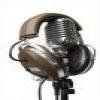
SUPPORTER
Posts: 372
Joined: 3 feb 2013
I don't know how to read notes either, everything I do is by ear and feeling. Having the opportunity to be musically creative in so many different genres and styles with so many fine musicians here at the loops is just AMAZING ! :)
SUPPORTER
Posts: 2098
Joined: 27 set 2014
Lol I can't read notes and don't even know chord names anymore, I had such a long pause from playing music that it all escaped my brain. When I started playing the guitar, I was trying to do covers, but this was the time when there were no Youtube videos and internet, it was really hard trying to figure out what was going on in a song. So out of frustration I started writing my own songs, that way I never got it wrong or used the wrong chords :D . So I don't jam to youtube, but I often jam to Wikiloop tracks without recording, just for the fun of it. If you read this, I probably jammed on your track :D :D
SUPPORTER
Posts: 96
Joined: 4 lug 2014
I also discovered that playing with the radio to not (yet) familiar songs is a good training. Trying to take some distance from my listening to my instrument and listen to the whole of the song. Feel the style and recognize the important chord changes, patterns and phrasing. This also helped to figure out the perhaps more difficult in between stuff. Or helps to make up a good substitution for it ;)
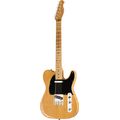
Harley Benton TE-52 NA Vintage Series
Electric Guitar

159 €
iThis widget links to Thomann, our affiliate partner. We may receive a commission when you purchase a product there.
Visit Shop
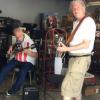
Member
Posts: 990
Joined: 16 ott 2011
Like what everyone has said so far here I myself couldn't read notes before wikiloops and over the 4 years here I have taught myself the notes on the bass. And now working on learning keys and guitar. As for playing to video's sometime I will but like some of the others I play what feels right to me. i will take a wiki track and work with it over and over (sometimes for hours) to get it the way it sounds good to me. Music is nothing more than what a person interprets as. Even some of the worst musicians in my opinion have made money from their playing. I was shown by others what to play at first and took it on to create my own style.

Member
Posts: 522
Joined: 27 feb 2015
I've been going to what I call 'jam nights' in my local area for several years now - I also used to go to them in the '90s too. Most people call them 'open mic' nights, but these are with a full band available rather than just individual performers. I was part of the 'house band' and just had to play whatever people said they wanted to. Someone usually wants to sing a few songs and we go up and back them without the faintest idea of what to play apart from a few chords shouted out at the start!
Rarely did I know the song I was playing (or had a vague idea of it) and it really pushes your creativity as you have to listen, jam, fit in, respond and rely on the communication (especially with the bassist in my case) between the players. It's fantastic fun and I recommend it to anyone looking to improve their improvisation skills. All abilities were welcome and you just laugh off the mistakes!
As my first drum teacher told me: if you make a mistake, do it again and make it look like you meant to do it!
Rarely did I know the song I was playing (or had a vague idea of it) and it really pushes your creativity as you have to listen, jam, fit in, respond and rely on the communication (especially with the bassist in my case) between the players. It's fantastic fun and I recommend it to anyone looking to improve their improvisation skills. All abilities were welcome and you just laugh off the mistakes!
As my first drum teacher told me: if you make a mistake, do it again and make it look like you meant to do it!

SUPPORTER
Posts: 541
Joined: 25 nov 2013
mpointon wrote:
I've been going to what I call 'jam nights' in my local area for several years now - I also used to go to them in the '90s too. Most people call them 'open mic' nights, but these are with a full band available rather than just individual performers. I was part of the 'house band' and just had to play whatever people said they wanted to. Someone usually wants to sing a few songs and we go up and back them without the faintest idea of what to play apart from a few chords shouted out at the start!
Rarely did I know the song I was playing (or had a vague idea of it) and it really pushes your creativity as you have to listen, jam, fit in, respond and rely on the communication (especially with the bassist in my case) between the players. It's fantastic fun and I recommend it to anyone looking to improve their improvisation skills. All abilities were welcome and you just laugh off the mistakes!As my first drum teacher told me: if you make a mistake, do it again and make it look like you meant to do it!
I've been going to what I call 'jam nights' in my local area for several years now - I also used to go to them in the '90s too. Most people call them 'open mic' nights, but these are with a full band available rather than just individual performers. I was part of the 'house band' and just had to play whatever people said they wanted to. Someone usually wants to sing a few songs and we go up and back them without the faintest idea of what to play apart from a few chords shouted out at the start!
Rarely did I know the song I was playing (or had a vague idea of it) and it really pushes your creativity as you have to listen, jam, fit in, respond and rely on the communication (especially with the bassist in my case) between the players. It's fantastic fun and I recommend it to anyone looking to improve their improvisation skills. All abilities were welcome and you just laugh off the mistakes!As my first drum teacher told me: if you make a mistake, do it again and make it look like you meant to do it!
Ditto Bro. I did same for a few years at an Auckland club. People would come in with their own tunes and want instant backing. You learn quickly to play lots of fudge notes that can go several ways and fit according to what comes after them. Same as the listen to the radio exercise except you have an audience...a bit more pressure. Was even more difficult when someone wanted to play a cover as I don't listen to much rock and pop.

Member
Posts: 139
Joined: 28 nov 2013
I never felt good enough to play live..But I sometimes use a downloader thing to download stuff(Backing tracks) from Youtube..there are some pretty good ones to practice on. I have a long ways to go in my own opinion. Here I sometimes try stuff new to me..some work.some don't..but either way I'll give something new a try as a challenge.
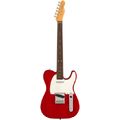
Fender AV II 63 TELE RW RED TRANS
Electric Guitar

2.249 €
iThis widget links to Thomann, our affiliate partner. We may receive a commission when you purchase a product there.
Visit Shop

Member
Posts: 522
Joined: 27 feb 2015
Wade wrote:[i]
Ditto Bro. I did same for a few years at an Auckland club. People would come in with their own tunes and want instant backing. You learn quickly to play lots of fudge notes that can go several ways and fit according to what comes after them. Same as the listen to the radio exercise except you have an audience...a bit more pressure. Was even more difficult when someone wanted to play a cover as I don't listen to much rock and pop.[/i]
Ditto Bro. I did same for a few years at an Auckland club. People would come in with their own tunes and want instant backing. You learn quickly to play lots of fudge notes that can go several ways and fit according to what comes after them. Same as the listen to the radio exercise except you have an audience...a bit more pressure. Was even more difficult when someone wanted to play a cover as I don't listen to much rock and pop.[/i]
First off. I'd have loved a sax being present at my jam nights - especially you playing. Second, the guys with an acoustic guitar and their own songs were always the hardest to back. But they always seemed to appreciate that we did our best so I'm happy.
Jamming is why I do it. I love the challenge and the spontaneity. I dep for a few bands and my notes are just some lyrics and cues. The rest is made up. I could make it easier for myself but I enjoy thinking on my feet. I have a blues gig I'm depping for next week. I have a rehearsal this Sunday and I haven't even listened to their set yet! I like living on the edge.
Or is that just being lazy and hoping you'll get away with it?

SUPPORTER
Posts: 541
Joined: 25 nov 2013
I'm with you...especially when there are lots of other things to do besides listening to and practicing something you know isn't that hard and you'll be able to get through with over 90% of the audience thinking its something you've practiced forever. It's all happening in live time... mistakes are forgotten as long as you carry on and have a good ending...unlike recording where a mistake is there forever.

Member
Posts: 16
Joined: 31 ago 2015
I went from 2008 until Christmas 2014 without owning a bass. I was fortunate that my brother got me a Lakland 55-01 for a gift that year. Prior to going without a bass, I was a fairly decent sight reader, knew my theory, and fretboard quite well, as I was playing regularly. When I first got the bass, I felt like a complete newb all over again. It was like everything I learned and was once good at, almost completely deteriorated. So I had no choice but to sit there and practice my scales, arpeggios, and all that comes with learning to play, all over again. Part of my routine includes trying to play along to youtube vids, and backing tracks they have there, as well as material on this site too. This place really is a good practice site too, because you can find stuff, exclude your instrument, and work on your improv skills by trying to create a line.
Member
Posts: 374
Joined: 25 mar 2012
Music is a strange activity. Think about it for a second. In what other field would it be accepted not to be able to document your work and not to be able to interpret such documentation. An engineer not able to draw and interpret diagrams is unthinkable. A writer not being able to both read and write is equally unthinkable, at least in the literate part of the world. And yet only about 3% of all the worlds music is notated in some kind of way.
And what is even stranger is that there is an almost religious belief in that way one has learned is the one and only right way. I think the pinnacle of that was when i heard Pat Metheny saying in a workshop that all other form of documentation other than notation was worthless.
I myself think you should practice your weak points. If you are good at reading, practice improvising. If you have good ears practice reading and transcribing and so on. No investment in skill knowledge and practice is ever wasted. Today there are a lot of tools and plentiful of free information to help you with that.
And what is even stranger is that there is an almost religious belief in that way one has learned is the one and only right way. I think the pinnacle of that was when i heard Pat Metheny saying in a workshop that all other form of documentation other than notation was worthless.
I myself think you should practice your weak points. If you are good at reading, practice improvising. If you have good ears practice reading and transcribing and so on. No investment in skill knowledge and practice is ever wasted. Today there are a lot of tools and plentiful of free information to help you with that.

Member
Posts: 522
Joined: 27 feb 2015
nilton wrote:
[i]Music is a strange activity. Think about it for a second. In what other field would it be accepted not to be able to document your work and not to be able to interpret such documentation. An engineer not able to draw and interpret diagrams is unthinkable. A writer not being able to both read and write is equally unthinkable, at least in the literate part of the world. And yet only about 3% of all the worlds music is notated in some kind of way.
And what is even stranger is that there is an almost religious belief in that way one has learned is the one and only right way. I think the pinnacle of that was when i heard Pat Metheny saying in a workshop that all other form of documentation other than notation was worthless.
I myself think you should practice your weak points. If you are good at reading, practice improvising. If you have good ears practice reading and transcribing and so on. No investment in skill knowledge and practice is ever wasted. Today there are a lot of tools and plentiful of free information to help you with that.[/i]
[i]Music is a strange activity. Think about it for a second. In what other field would it be accepted not to be able to document your work and not to be able to interpret such documentation. An engineer not able to draw and interpret diagrams is unthinkable. A writer not being able to both read and write is equally unthinkable, at least in the literate part of the world. And yet only about 3% of all the worlds music is notated in some kind of way.
And what is even stranger is that there is an almost religious belief in that way one has learned is the one and only right way. I think the pinnacle of that was when i heard Pat Metheny saying in a workshop that all other form of documentation other than notation was worthless.
I myself think you should practice your weak points. If you are good at reading, practice improvising. If you have good ears practice reading and transcribing and so on. No investment in skill knowledge and practice is ever wasted. Today there are a lot of tools and plentiful of free information to help you with that.[/i]
Totally agree. One thing is for sure and that is you can never know it all. You will never stop learning. People do tend to place a heavy emphasis on the ability to read music whereas I beg to differ. The ability to read music merely gives you access to being able to read someone else's ideas or make a permanent record of your own. Musical notation is merely a method of recording your ideas so someone else can repeat it. It's a highly useful skill but one that is very much optional in my opinion and a person who cannot is no less a musician for it.
Especially in contemporary music, reading isn't as vital as it is in, say, the classical arena. Certainly for drums, most modern drum charts rely on your experience and skill in interpreting a style. The chart merely provides cues, phrases and structure. It's common to just have lots of '/' 'repeat the last bar' symbols with the odd phrase on the top line for any specific rhythmic phrases you must follow. Even then, you're given the rhythm of the phrase but not what to play it on - it's up to your musical sensibility how to execute it.
This is a good example of a drum chart:
[img]https://marksuttondrummer.files.wordpress.com/2015/06/great-drum-chart-0012.jpg[/img]
Most of it is up to you what you play! And it's really hard to keep track of lots of blank bars! So even when reading music, you're still jamming!
wikiloops online jamsessions are brought to you with friendly
support by:

Wikiloops has not only improved my bassplaying, but I have also made new friends around the world! For example I visited Wade in NZ last year.
haddock